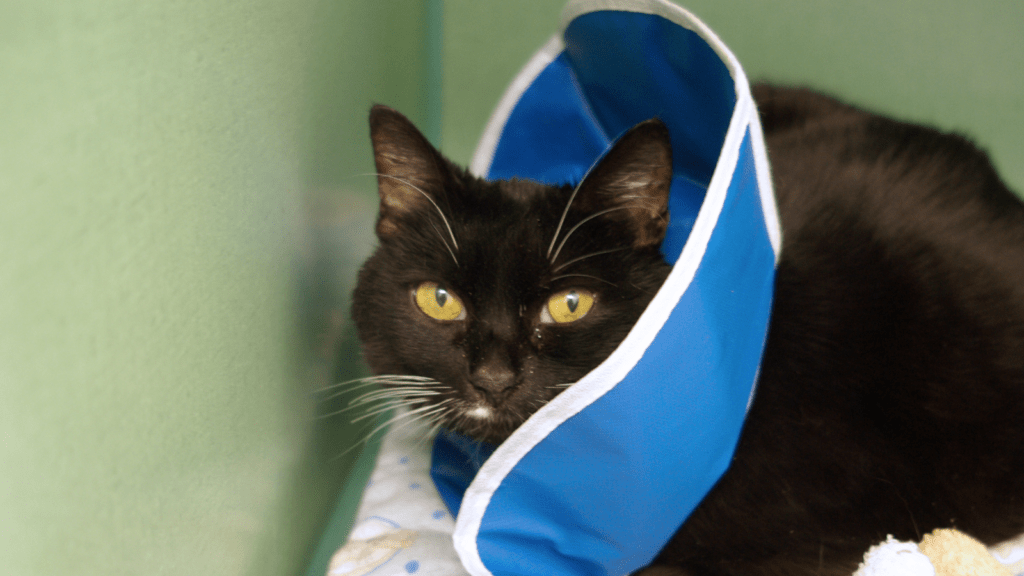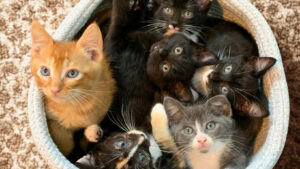“An ounce of prevention is worth a pound of cure”
-Benjamin Franklin
In the last decade, the number of cats coming into Portland metro area shelters from the public has decreased over 50%. Why the drastic change? Well, several things. But a huge piece of this effort has been accomplished through a simple but effective campaign to spay and neuter our cats.
At only four months of age a cat can go into heat and become pregnant. These young cats are still kittens themselves. Female cats can have up to three litters a year, and over time that can translate to well over a hundred kittens added to the population. Yikes!
why spay or neuter your cat?
Even if you think you could find a home for the kittens, there are lots of good reasons to spay or neuter your cat besides helping to reduce the cat population.
In male cats, neutering can prevent unwanted urine spraying and reduce fighting with other males. Spaying a female cat can greatly reduce her risk of cancer and uterine infection. And for both sexes, being spayed or neutered can decrease the urge to yowl or try to escape from home to find a mate.
ABOUT SPAY/NEUTER SURGERY
Worried about how your young cat or kitten will adjust to surgery? Wonder how old your cat should be before they are spayed or neutered? At CAT we safely alter (another term for spay/neuter) kittens between six and eight weeks of age, as long as they are healthy and have reached 1.5 lbs.
“Kittens spayed and neutered at a young age recover so much faster! They are often up and eating a snack within an hour of surgery.”
-Dr. Dianne Brown, CAT’s medical director
It’s common for female cats who’ve been spayed to experience quieter-than-normal behavior and a reduced appetite for a couple days following surgery. Neutering is less complicated, and male cats will often display no change in behavior after surgery. You can help your cat recover by keeping them calm and discouraging excess play while they heal. Monitor their surgical site and keep them indoors. Make sure a cone or other type of collar stays on so that they can’t lick the incision, which can cause irritation or infection. Consider isolating them from other pets if you have concerns about another animal in the home investigating your cat’s surgical site and complicating the recovery process.
LOW-COST SPAY/NEUTER OPTIONS
We know spay and neuter surgeries can be costly. Thankfully there are resources available to help.
Spay & Save is a Portland metro area-wide program operated by the Animal Shelter Alliance of Portland (ASAP) that offers low-cost spay/neuter services to our community. As a Spay & Save partner, CAT’s spay/neuter clinic offers low-cost options for pet cats. Our clinic recently reopened, and we’re working hard to make spay/neuter services available to as many cats as possible.
The Oregon Humane Society is also offering a limited number of spay/neuter appointments for cats at their shelter in North Portland.
COVID-19 IMPACTS ON SPAY/NEUTER
Due to the pandemic, Spay & Save was forced to close temporarily. Spay & Save partners performed several thousand fewer surgeries in 2020 than in 2019. This reduction in surgeries impacts our community in a couple of ways.
First, although many veterinary clinics have re-opened, most can’t perform as many surgeries as before the pandemic due to physical distancing adjustments that keep staff and clients safe. And some are still catching up after being closed temporarily. With fewer appointment spots available, it can be more difficult to schedule a spay/neuter surgery for your pet right now. Second, with fewer cats having been altered over the past year or so, we expect to see an increase in the number of kittens being born this year and next.
To prepare for an influx of kittens and increase our surgery capacity, CAT recently moved our surgical dental suite. This allows us to perform both dental surgeries and spay/neuter surgeries on the same day, meaning we were able to increase the number of spay/neuter surgeries our veterinary team can perform each day.
Our ability to perform these much-needed surgeries is now starting to increase, but availability and capacity will remain lower in 2021 than it was pre-pandemic. Our community worked together over the past decade to alter a record number of cats in the Portland metro area. So while the COVID-19 pandemic has set us back some for now, we know that it’s not forever.







